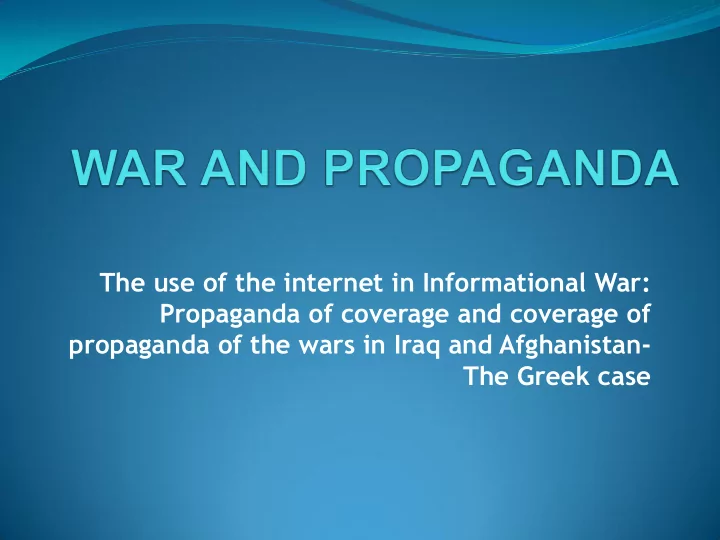

The use of the internet in Informational War: Propaganda of coverage and coverage of propaganda of the wars in Iraq and Afghanistan- The Greek case
Basic notions Three are the basic notions taking part into our presentation: WAR 1. PROPAGANDA 2. INTERNET 3.
From industrial wars to contemporary wars Industrial war From WWI (1914)- wars conducted during the 1970’s Territorial sovereignty as main cause Mobilization of great parts of population engaging gradually the sum of society Dominant role of the state (takes control of key structures)
From industrial wars to contemporary wars Contemporary informational wars They are presented as interventions on behalf of an ecumenical discourse and an ecumenical value system They are characterized by a catalytic for the outcome of the war disproportion of power between the adversaries They are expected to last only a few weeks They tend to be rationalized cloaked in the necessity of global peace and harmony More than ever “informational wars” aiming at defining war as a situation comprised of “information procedures”
Propaganda Kaleidoscopic notion including many different aspects 1. Method of dispersion of lies (early 20 th century theorists) 2. Psychological method, based on psychological manipulations 3. Act or series of acts aiming at certain aims and results 4. Communication process
Propaganda We define propaganda in order to clarify what propaganda means for the contemplations and the rationale of the current research: Propaganda is both discourse and action, thought and implementation. To be more specific we consider propaganda as deliberately conducted process of thought, discourse and action or discourse as action, practiced by individuals or groups using means of communication and aiming at influencing other individuals or groups to adopt or not to adopt certain opinions, attitudes or practices
The internet informational environment In Greece 42% of the users surf the internet searching and downloading news updates from news portals Decentralized structure extrication from a single central control organization considered to be more independent than traditional media Information abundance Great speeds of information dissemination Merger of different types of discourse, such as text, sound, image and video within the same medium
Main Research Question-Research Method Our main research question is whether the news articles of three Greek portals (ert.gr, in.gr, flash.gr) reporting the news on the wars in Iraq and Afghanistan can be said to conduct a coverage containing propagandistic elements promoting the strategy of informational war of western coalition forces Content analysis of all articles (79) of three news portals reporting on the wars in Iraq and Afghanistan (www.ert.gr, www.flash.gr, www.in.gr) presented between 12 April and 12 May
Key Findings-Sources Nationality of Journalist source 45.0 40.0 35.0 30.0 25.0 20.0 15.0 10.0 5.0 0.0 US UK France Greece Other Arab country
Key Findings-Sources Original non-journalist source of the article Iraqi or Afghani army, police, authorities Illegal-terrorist organization United Nations Western State organization (ministry, official departments etc.) U.S. or coalition Army 0 2 4 6 8 10 12 14 16
Key Findings-Visual dramatization What do images show us? Other Other Arab politicians Iraqi or Afghani politicians Western politicians Victims of kidnaps or executions Terrorists Coalition soldiers "doing their job" Images of children or faces of children Images of adult citizens in places that have undergone attacks Images of a place undergone an attack Just images from Iraq, not having to do with an event 0.0 5.0 10.0 15.0 20.0 25.0 30.0 35.0 40.0 45.0
Key Findings-Structure of Articles Number of news reports (different facts) contained in a single article 19% 42% No, only one 16% Yes, two reports Yes, three reports 23% Yes, more than three reports
Key Findings-Content of Articles Thematic category of the reports Other Polls, researches, statistical results Procedure of coalition army Political procedures in other countries influencing the conflicts Political procedures in the US and UK influncing the conflicts Statements of western politicians Statements of Iraqi or Afghani politicians Reporting of everyday life in Iraq or Afghanistan Political procedures within Iraq or Afghanistan Violent act against other person, mainly citizens Violent act against the coalition forces and the new regime Conflict between the coalition forces and Iraqis or Afghanis 0.0% 5.0% 10.0% 15.0% 20.0% 25.0% 30.0%
Key Findings-Content of Articles To which conflict do the reports refer? 1% 15% Iraq Afghanistan Both 84%
Key Findings-Content of Article Which side's opinion is mostly presented in the reports? 9% Opinion of western coalitions 91% Opinion of groups opposing western forces
Conclusion There are propagandistic elements in the coverage of wars in Iraq and Afghanistan: 1. Unilateral journalist sources 2. Coalition army and regimes appear as protogenic sources 3. Visual dramatization (through images, pictures) in favor of the coalition forces 4. Iraq is being far more reported, because it needs to be propagated more to justify its conduct 5. Unilateral presentation of opinions (almost only of western side)
Recommend
More recommend